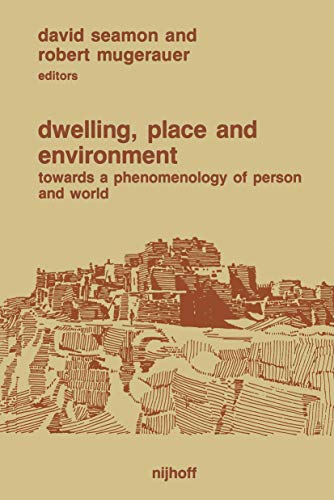
Inhaltsangabe
themes among the essays resurface and resonate. Though our request for essays was broad and open-ended, we found that topics such as seeing, authenticity, interpretation, wholeness, care, and dwelling ran as undercur- rents throughout. Our major hope is that each essay plays a part in revealing a larger whole of meaning which says much about a more humane relation- ship with places, environments and the earth as our home. Part I. Beginnings and directions At the start, we recognize the tremendous debt this volume owes to philosopher Martin Heidegger (1890-1976), whose ontological excavations into the nature of human existence and meaning provide the philosophical foundations for many of the essays, particularly those in Part I of the volume. Above all else, Heidegger was regarded by his students and colleagues as a master teacher. He not only thought deeply but was also able to show others how to think and to question. Since he, perhaps more than anyone else in this century, provides the instruction for dOing a phenomenology and hermeneutic of humanity's existential situation, he is seminal for phenomenological and hermeneutical research in the environmental disci- plines. He presents in his writings what conventional scholarly work, especially the scientific approach, lacks; he helps us to evoke and under- stand things through a method that allows them to come forth as they are; he provides a new way to speak about and care for our human nature and environment.
Die Inhaltsangabe kann sich auf eine andere Ausgabe dieses Titels beziehen.
Reseña del editor
themes among the essays resurface and resonate. Though our request for essays was broad and open-ended, we found that topics such as seeing, authenticity, interpretation, wholeness, care, and dwelling ran as undercur rents throughout. Our major hope is that each essay plays a part in revealing a larger whole of meaning which says much about a more humane relation ship with places, environments and the earth as our home. Part I. Beginnings and directions At the start, we recognize the tremendous debt this volume owes to philosopher Martin Heidegger (1890-1976), whose ontological excavations into the nature of human existence and meaning provide the philosophical foundations for many of the essays, particularly those in Part I of the volume. Above all else, Heidegger was regarded by his students and colleagues as a master teacher. He not only thought deeply but was also able to show others how to think and to question. Since he, perhaps more than anyone else in this century, provides the instruction for dOing a phenomenology and hermeneutic of humanity's existential situation, he is seminal for phenomenological and hermeneutical research in the environmental disci plines. He presents in his writings what conventional scholarly work, especially the scientific approach, lacks; he helps us to evoke and under stand things through a method that allows them to come forth as they are; he provides a new way to speak about and care for our human nature and environment.
Reseña del editor
By presenting an eclectic collection of 17 articles, the editors aim to illustrate the variety of ways in which a phenomenological perspective can contribute fresh insights into architectural and environmental concerns. The essays originate from a wide variety of disciplines (including architecture, philosophy, music, physics, psychology, religious studies, and geography) and explore themes that range from blind persons' environmental experiences to sacred wells in Ireland.
„Über diesen Titel“ kann sich auf eine andere Ausgabe dieses Titels beziehen.
Weitere beliebte Ausgaben desselben Titels
Suchergebnisse für Dwelling, Place and Environment: Towards a Phenomenology...
Dwelling, Place and Environment: Towards a Phenomenology of Person and World;
Anbieter: books4less (Versandantiquariat Petra Gros GmbH & Co. KG), Welling, Deutschland
gebundene Ausgabe. Zustand: Gut. 310 Seiten; Das hier angebotene Buch stammt aus einer teilaufgelösten wissenschaftlichen Bibliothek und trägt die entsprechenden Kennzeichnungen (Rückenschild, Instituts-Stempel.); leichte altersbedingte Anbräunung des Papiers; der Buchzustand ist ansonsten ordentlich und dem Alter entsprechend gut. Einbandkanten sind leicht bestoßen. In ENGLISCHER Sprache. Sprache: Englisch Gewicht in Gramm: 720. Artikel-Nr. 1760877
Gebraucht kaufen
Anzahl: 1 verfügbar
Dwelling, Place and Environment: Towards a Phenomenology of Person and World;
Anbieter: books4less (Versandantiquariat Petra Gros GmbH & Co. KG), Welling, Deutschland
gebundene Ausgabe. Zustand: Gut. 310 Seiten; Der Erhaltungszustand des hier angebotenen Werks ist trotz seiner Bibliotheksnutzung sehr sauber. Es befindet sich neben dem Rückenschild lediglich ein Bibliotheksstempel im Buch; ordnungsgemäß entwidmet. In ENGLISCHER Sprache. Sprache: Englisch Gewicht in Gramm: 720. Artikel-Nr. 2097995
Gebraucht kaufen
Anzahl: 1 verfügbar
Dwelling, place and environment. Towards a phenomenology of person and world
Anbieter: Antiquariaat Schot, Hendrik-Ido-Ambacht, Niederlande
310 p. Hardcover (Fine copy.). Artikel-Nr. 04565
Gebraucht kaufen
Anzahl: 1 verfügbar
Dwelling, Place and Environment : Towards a Phenomenology of Person and World
Anbieter: Godley Books, Hyde, Vereinigtes Königreich
Hard Cover. Zustand: Near Fine. First Edition. No inscriptions or marks. No creasing to covers or to spine. A lovely clean very tight copy with bright unmarked boards, very slight foxing to page edges and no bumping to corners. This book provides innovative approaches to the person-environment relationship not often found in conventional environmental and human research. It will be of significant value to the environmental disciplines and professions, as well as to scholars and lay people who seek a new way to understand and improve people's relationship with the natural and built environments. 310pp. We do not use stock photos, the picture displayed is of the actual book for sale. Every one of our books is in stock in the UK ready for immediate delivery. Size: 9.75 x 6.5 inches. Artikel-Nr. 004237
Gebraucht kaufen
Anzahl: 1 verfügbar

